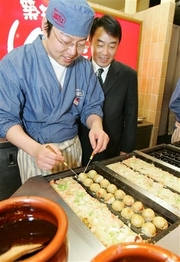Japanese look to export octopus dumplings
Takoyaki, or octopus dumplings, is going abroad.

Now, takoyaki or other lowbrow Japanese chows are going abroad.
I hope that they will be successful. And I like to eat cheaper Japanese foods outside Japan.
(Quote)
Japanese look to export octopus dumplings - Yahoo! News
Sun Jun 25, 3:49 PM ET
TOKYO - If Morio Sase has his way, hungry teenagers around the world will soon be snacking on something more exotic than McDonald's hamburgers: takoyaki, or octopus dumplings.
With more than 350 takeout stores in Japan, Hong Kong and Taiwan already, Sase's Gindaco chain is one of a barrage of fast-food companies bringing lowbrow Japanese chow to overseas markets. Its first U.S. store is scheduled to open in Los Angeles in 2007, and it hopes to open 20 stores in California by 2010.
"When I was a small boy, it was street food that made me feel good and warm inside," Sase said at a recent interview at the Tokyo headquarters of HotLand Corp., which runs Gindaco.
Hand-grilled in iron molds by cooks behind a large display window, the octopus dumplings are made from wheat flour paste mixed with fish stock, spring onions and boiled octopus chunks, and drizzled with a sweet sauce, dried bonito flakes and seaweed.
"Foods like takoyaki are closer to Japanese hearts than sushi or sashimi," Sase said. "They're delicious, healthy and warm — the perfect snack."
Faced with uncertain demand for fast food as Japan's population ages, an increasing number of the nation's chains are looking overseas for new markets.
Government figures show nearly one in five Japanese were aged 65 or older in 2004, and the domestic food restaurant market has declined for seven straight years since 1998, according to the Food Service Industry Research Center.
One of the first Japanese fast food chains to head overseas was the beef bowl chain Yoshinoya D&C Co. Since its first U.S. store in Denver in 1975, Yoshinoya's American network has grown to 82 eateries in California and New York.
Last year, those eateries raked in about $77.3 million in sales for a profit of $2.5 million — still a fraction of its overall earnings. It expects sales to grow to $78.9 million in 2006.
"We initially had to tackle a preconception of Japanese food as haute cuisine, especially in America," said Yasunori Yoshimura, a spokesman for Yoshinoya in Tokyo.
A far cry from pricey, elegant sushi, a regular bowl of the grilled beef over rice sells for $3.18 at U.S. stores.
"We're convinced whatever people find tasty in Japan, people anywhere would find tasty," he said.
Both Gindaco and Yoshinoya hope to emulate the success of other Asian fast food chains like Panda Restaurant Group Inc.'s Panda Express chain, which serves Chinese food at over 800 eateries in the U.S., Puerto Rico and Japan.
And they have a good chance, analysts say.
"There's definitely an Asian food boom in the U.S. at the moment" which Gindaco could use to its advantage, said Maria Caranfa, a food industry analyst at the Chicago-based consumer research company, Mintel Group.
A study by research company MarketResearch.com found that total Asian and Indian food retail sales across all sectors — from ethnic markets to convenience stores — jumped 27.3 percent to $3.3 billion between 2000 and 2004.
The U.S. fast food industry as a whole continues to expand, which means plenty of opportunities for newcomers, Caranfa said. The National Restaurant Association forecasts that quick-service restaurants in the U.S. will reach $142 billion in sales in 2006, up 5 percent from the previous year.
Moreover, Caranfa says younger age groups — major fast food consumers — are especially keen to try new flavors.
"We're finding that American teenagers and younger consumers are more adventurous with their food choices than their parents might be," Caranfa said. "I do think even octopus could catch on."
Part of the fun of the octopus dumplings is watching them being cooked. It takes the chefs months to learn to grill the takoyaki to a crisp golden brown on the outside, while keeping the inside soft and fluffy, according to Makoto Takasu, who heads Gindaco's operations in Hong Kong.
"Everybody who tries them loves them, even those who feel squeamish about octopus," Takasu said of takoyaki. "And our customers love watching the cooks. They know their food is fresh off the grill."
Other Japanese chains going global include Shigemitsu Industry Co.'s noodles-in-soup restaurant, Ajisen Ramen — whose network now includes stores in China, Southeast Asia, Australia, the U.S. and Canada — and the Japanese beef-and-vegetable dumplings giant Osho Food Service Corp., which opened its first overseas store in China in 2005.
Another is the Tokyo-based Koots Green Tea chain, which opened its first overseas store in Seattle in May, hoping to tap the U.S. cafe market with a lineup that includes green tea lattes and smoothies.
"Koots translates traditional Japanese green tea culture into an everyday experience for U.S. consumers," said Tomoko Takahashi, a spokesman for Koots in Tokyo. The company intends to open four more stores in Washington state this year.
And Beard Papa, a cream puff store chain run by Japan's Muginoho Corp., has opened popular outlets in New York and San Francisco.
Sase and his staff at Gindaco say they've struck a winning formula with their octopus balls and don't intend to change a single ingredient for their overseas customers. And if overseas expansion goes as planned, HotLand expects its overseas sales to reach $89 million by 2010, about the same as its current domestic sales.
To woo octopus skeptics, U.S. stores may feature additional entertainment, says Yohei Miki, who heads the company's overseas operations.
"We're thinking of getting our cooks to chop the spring onions using Japanese swords," Miki chuckled. "You know the Americans, they love attractions."
(Unquote)









